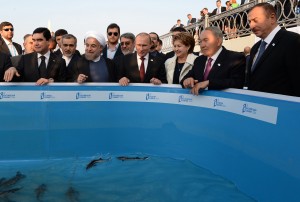The presidents of the five Caspian littoral states reached several important agreements, including an agreement on the conservation of marine resources, on their way to settling the legal status of the sea at the fourth Caspian Summit in Astrakhan, Russia, on Sept. 29.
 Presidents Ilham Aliyev of Azerbaijan, Hassan Rouhani of Iran, Nursultan Nazarbayev of Kazakhstan, Vladimir Putin of Russia and Gurbanguly Berdymukhamedov of Turkmenistan participated in the talks in the city on the Volga River, not far from the Caspian Sea.
Presidents Ilham Aliyev of Azerbaijan, Hassan Rouhani of Iran, Nursultan Nazarbayev of Kazakhstan, Vladimir Putin of Russia and Gurbanguly Berdymukhamedov of Turkmenistan participated in the talks in the city on the Volga River, not far from the Caspian Sea.
The leaders of the five Caspian states first met in a narrow format to discuss the most sensitive problems on the agenda: the legal status of the Caspian Sea and the military component of security there.
Then, the talks continued in an extended format, followed by a signing ceremony of joint documents and a statement. A joint political statement was made by the five presidents, which will become a cornerstone of a future convention on the legal status of the Caspian Sea.
The main theme of the summit of Caspian states was the future convention on the legal status and the delimitation of the Caspian Sea. The talks over the document have been ongoing for more than 15 years. Kazakhstan’s position on the legal status of the Caspian Sea is to apply certain provisions of the UN Convention on the Law of the Sea of 1982 relating to the width of the modes of different parts of the sea.
According to the Kazakh President, the Caspian region is growing rapidly, and in light of its available energy resources and biological resources, the world is paying increasing attention to the area.
The Caspian Sea is a unique water area in terms of its biological and ecological resources, which includes more than 500 kinds of sea plants and 854 fish species, including the Caspian sturgeon, which accounts for 90 percent of the world stock of sturgeon fish.
The amount of Caspian hydrocarbon resources has been estimated at around 18 billion tonnes, with the proved reserves put at 4 billion tonnes. This brings the Caspian Sea to second place after the Persian Gulf in the rankings of the world’s biggest oil and gas reserves.
At the press conference on the results of the summit, Nazarbayev noted the special importance of the Caspian Sea for the five countries and the constructiveness of the summit.
“Today’s summit has once again demonstrated the intention of the Caspian states to agree on all the tough questions. A number of important regional issues were discussed. We decided that the next such event will be held in Kazakhstan,” Nazarbayev said describing the results of the meeting as a “breakthrough.”
In, perhaps, the most important agreement reached, the five presidents announced in their statement that they agreed to specific principles on which they would base their activities on the sea including imposing the national sovereignty of each of the countries over the 15-mile areas off the respective coasts and the exclusive rights of each of the five parties to procure water biological resources in another 10-mile areas adjacent to the national sovereignty zones. They noted that, beyond those two zones which make up 25-mile zones, the sea will be considered a common water zone. The presidents stressed, however, that the issue of determining specific methods to define the starting coast lines for calculations will be subject to further consultations.“I am confident that the results of the Astrakhan summit will give a new impetus to the process of adoption of the main document, the convention on the legal status of the Caspian Sea,” he added.
Nazarbayev also reported on a number of initiatives launched during the summit, including Turkmenistan’s proposal regarding the formation of a permanent Caspian Economic Forum, as well as Kazakhstan’s initiative on the creation of the Caspian Free Trade Area.
He stressed that the parties can lay the foundation for economic cooperation even before the settlement of the legal status of the Caspian Sea.
“Taking into account the current situation in the world market, there is a possibility to consider closer cooperation between our economies and increase mutual trade,” Nazarbayev said.
“In my opinion, we had a very important negotiation for all our countries, which reinforced our belief that the Caspian Sea is a sea of peace and friendship,” the President of Kazakhstan said.
An agreement on the conservation and sustainable use of marine biological resources of the Caspian Sea was signed during the summit. It is expected that the parties will work to improve the living conditions of sturgeons in the Caspian Sea, develop natural and artificial reproduction of fish resources and combat illegal fishing. Nazarbayev said that the task of the Caspian countries is to protect the unique biological system of the Caspian Sea.
Following the talks, the heads of state adopted the Communiqué. An agreement on cooperation in the field of hydrometeorology of the Caspian Sea and an agreement on cooperation in the field of prevention and elimination of emergency situations in the Caspian Sea were also signed.
According to President Putin, the convention on the legal status of the Caspian Sea may be signed in the near future.
“I will not say that all questions are fully resolved, but their number has significantly decreased. The experts were tasked to intensify consultations on several remaining issues, so there is reason to believe that in the near future, we will come up to the signing of the convention,” he said.
At the conclusion of the summit, the five leaders took part in a ceremony of releasing sturgeon fingerlings into the Volga River.

